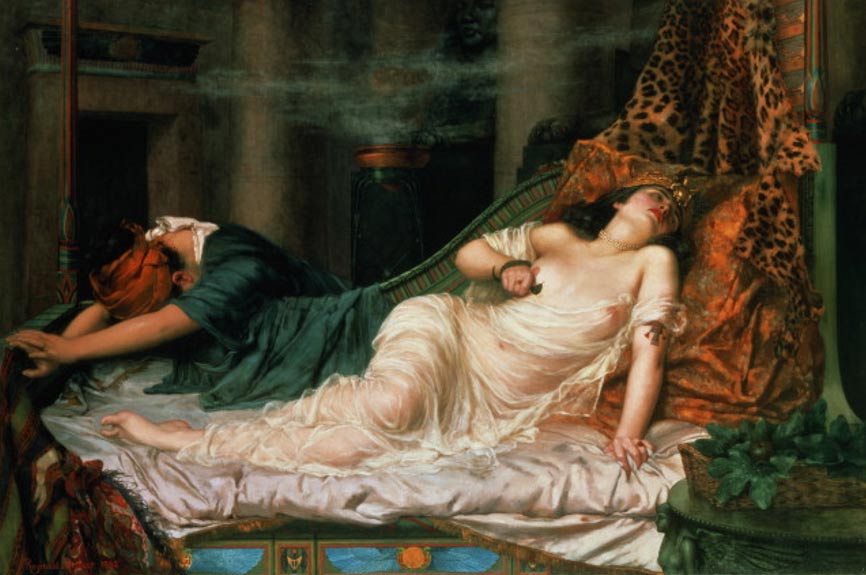As a companion piece to my list of influential Roman women, here are some contemporaries from Carthage and Egypt whom I find interesting.
The Mother of an Empire
Despite being a massive aficionado of Carthaginian history (what little of it survives), somehow I never read about the real story of its founder for years. Everybody knows of the romance with Aeneas because of the Aeneid, but the real story is that Elissa (aka Dido to the Romans) killed herself to avoid marriage with Iarbas, a local king whom she did not love. His army threatened the city should she refuse, so as a way to escape this entrapment, Elissa threw herself into a funeral pyre. It may not as romantic and sweeping as Vergil’s poem, but it’s a lot more selfless and dignified than the fictional narrative where she snap kills herself out of pure lovesickness, In real life, Elissa was put in an impossible dilemma between her honor and the city’s best interests, so she chose the only way out which sacrificed neither.

I always found the story of Dido to be a sad counterpart to that of Rome’s foundation. Where the Roman origin emphasizes the rustic hardiness and masculine virility of its actors, Carthage seems born out cunning and sacrifice. Romulus sacrifices his brother in the name of the city’s defenses, killing Remus for belittling the walls of the Palatine. To acquire women for the male settlers of Rome, the nearby Sabine women were abducted. The Sabine men reacted by declaring war, which the Romans decisively won, foreshadowing Rome’s future aggressiveness and prowess. By contrast, Dido peacefully negotiated with the local Berber peoples by agreeing to accept only as much land as could be covered by an ox hide. Portending Carthage’s future ingenuity as much as its demise, she tricked the Berbers by cutting the hide into thin strips which could surround the Byrsa hill, then sacrificed herself. Her story, fleeing from the Phoenician king Pygmalion only to meet her end because of another king, Iarbas, strikes me as metaphor for women’s lack of peace or the means to become self-sufficient in the ancient world.
To further the tragedy of Carthage and Elissa, even the stories we have are corrupted and/or overshadowed by the Greeks and Romans. For example, the word “Byrsa” is said to derive from the word of ox hide. However, that’s using the Greek word for hide, not the Phoenician. (According to wikipedia, the real etymology for Byrsa hill was probably from the Phoenician word for “fortification.”) This implies that the story of slicing the ox hide into thin strips may have been a later invention from Greco-Roman authors as opposed to one of Carthaginian origin. And of course, there’s the fact that Vergil’s anachronistic romance between Dido and Aeneas has completely overshadowed the more accurate story in the public consciousness. Even in death, Elissa was conquered by the Romans, who determined what her literary legacy would be.

Other Women of Carthage
Although I’d read about these next two stories before, it never really clicked with me that there seems to be a trend of proud women brought to suicide in the interests of preserving their dignity before writing this piece. Aside from Elissa, there was Sophonisba, who married the Numidian king Masinissa during the Second Punic War and killed herself to avoid being humiliated in a Roman triumph. The similarity between hers and Elissa’s fates has been noted by other writers, including Petrarch. Not only that, it’s inspired several fictional depictions and reverent paintings the same as Carthage’s founder.

And then there was the unnamed wife of Hasdrubal (the general in charge of the defense of the city during the Third Punic War.) Her fate combined elements of both this motif of honorable feminine suicide and the death-by-funeral-pyre popularized in the Aeneid. She threw herself into the flames during the final invasion of the city in order to avoid the humiliation of being paraded in a triumphal procession. Her husband was not so brave and surrendered to the Romans, so she left him with these last words:
“Wretch, traitor, most effeminate of men, this fire will entomb me and my children. Will you, the leader of great Carthage, decorate a Roman triumph? Ah, what punishment will you not receive from him at whose feet you are now sitting.”
It’s very possible that this quote was a Roman propaganda invention to defame the men of Carthage further. It’s not enough they destroyed the city, the unique Punic culture and killed or enslaved everyone; they also humiliated the dead men in the historical record by being henpecked by their women. However, if based on a true incident, I think this may be one of the most amazing quotes of the Ancient World. It shows a woman more fearless than her husband in a time when women were considered weak, empty-headed property. It brings full circle the story of a land founded and concluded by strong women who chose their dignity over rape and subjugation. It’s the brief surviving anecdotes like these which fuel my fascination of Carthage despite the lack of historical accounts or native Punic literature.

I find it inspiring that, despite there being so little we know about Carthage, there’s this motif of dignified women committing suicide rather than allow themselves to be brought down by the Romans. It’s an interesting antithesis to the extremely masculine and aggressive Roman culture. The motif also extends beyond Carthage itself with the most famous woman of the ancient world, Cleopatra, also committing suicide to avoid a Roman triumph. (Her sister, Arsinoe had herself appeared in Julius Caesar’s triumph after his victory in Egypt, though she was not ritually strangled as was customary.) In a world where women couldn’t reign as leaders (Elissa herself being a rare exception) or command armies (Zenobia being a rare exception) sometimes the only winning move was not to play the game at all. It’s worth noting that in their own way, these women were just as courageous as their male counterparts, not fearing death and denying Rome the satisfaction of humbling them.



You redirected me to the fascinating, doomed city of Carthage after rather more years than I’d care to mention! One more thing to thank you for, C.
LikeLike
It’s ineffably sad that the main takeaway is there is no Carthaginian history. A riddle wrapped in an enigma. Nicely nuanced article, but I wish the writer had more to work with. Counter-history: What if Carthage had won the Punic Wars? Unknowable, of course, but disquieting to think that modern Cathaginians are Tunisians and Lebanese. They have come close to establishing modern trans-tribal states, but no cigar. Almost all tour guides now present Andalusia as multi-cantonal paradise that Ferdinand and Isabella screwed-up. Refreshing change from Habsberg/Catholic dogma, but overlooks it practised slavery and the status of women fell well short of contemporary Danish standards. In Cuba on a state-spinsored tour in 2002 led by an eager beaver junior achiever we were taken to a Potemkin village to witness typical Cuban kids sharing a bag of candy like good socialists and not fighting over it like phoney western liberals. A Canadian labour leader said, “Let’s test your theory”, and threw out a handful of hard currency. Everyone of them earned a Five Minute fighting penalty and one tall girl a Game Misconduct. Or in futball terms, Red Cards all around. If you enjoy that kind of thing, Christopher Hitchens is your man. His biography of saint Sister Theresa is priceless. Her staff detested her and “this medieval Albanian peasant would happily burn you and everyone you know for heresy”. Keep up the good work.
LikeLiked by 1 person
Thank you for your comment!
LikeLike